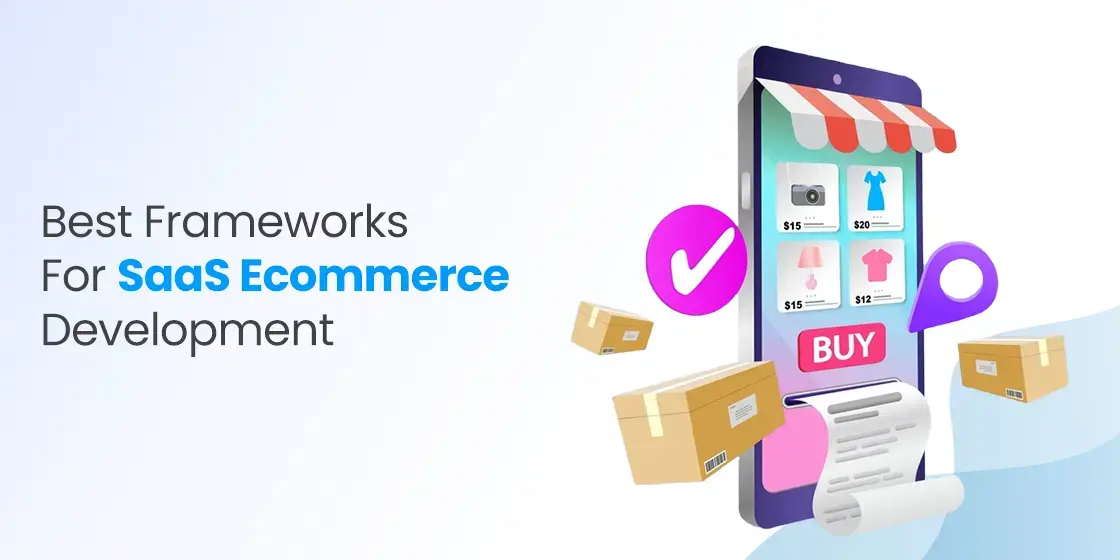Table of Content
Top SaaS Ecommerce Development Frameworks for 2025
Creating a SaaS ecommerce application requires a particular set of tools to cover all types of development work. There are plenty of specialized SaaS ecommerce development frameworks available out there that could help you to build such projects. Based on the requirements, you need to pick the best framework from the available list, as the execution and outcome of any project depends heavily on it. If you are new to the dev field and don’t know much about useful ecommerce frameworks, read this article in detail.
Being a developer, it is important for you to know about all the frameworks that are used for SaaS ecommerce app development. It not only enhances your knowledge, but also gives you the ability to check the efficiency of various frameworks in performing different tasks. This article will let you know about those SaaS ecommerce development frameworks that are used most in the market. So, without wasting much time, let’s take a look at those frameworks that are preferred by professional software development services for ecommerce apps.
What are Ecommerce Development Frameworks?
An ecommerce development framework is a pre-built software framework specifically designed to simplify and speed up the process of building, and maintaining ecommerce websites. It provides a structured foundation for developers to work on, offering reusable components that handle core functions and responsibilities. By using a framework, developers can avoid building these features from scratch, allowing them to focus on creating customizations and unique aspects of the store.
These frameworks are designed with scalability, performance, and security in mind. They often include features like responsive design, SEO optimization, and multi-currency support, ensuring the ecommerce store works well across devices and reaches a broader audience. Some of the top software development frameworks such as Magento, WooCommerce, and Shopify are commonly used for building ecommerce websites, and they offer various features like customizable templates, plugins, and third-party integrations to enhance the user experience and streamline operations.
In addition to functionality, ecommerce frameworks also emphasize ease of maintenance and future upgrades. With a well-built framework, developers can update the store with minimal downtime or issues, and customers experience a seamless shopping experience. The use of an ecommerce framework helps businesses scale more efficiently by accommodating growing traffic, increasing product offerings, and expanding into new markets while minimizing the complexity of managing the back-end systems.
Fuel innovation by leveraging bespoke software solutions. Get in touch with our team of experts to build cutting-edge software products.
Get a QuotePopular SaaS Ecommerce Development Frameworks
It is important to pick the right framework for SaaS ecommerce app development. Each framework offers unique functionalities, so picking the perfect one that aligns with your project goals is certainly considered important. Here are some of the best SaaS ecommerce development frameworks you should know about.
Shopify

Shopify is widely regarded as one of the leading platforms for ecommerce app. Its popularity stems from its ability to provide a seamless, all-in-one solution for business owners who want to quickly launch an online store. By offering a fully managed service, Shopify removes the complexities of handling server maintenance, security updates, and other technical aspects of running an ecommerce site. This allows entrepreneurs to focus more on growing their business rather than dealing with the intricacies of web development.
One of the key factors that sets Shopify apart is its user-friendly interface, which enables business owners, even those with minimal technical knowledge, to create and manage their online stores with ease. The platform offers a vast array of customizable templates, themes, and plugins, giving store owners the flexibility to tailor their store’s design and functionality to their specific needs. Whether it’s managing product catalogs, processing payments, or handling customer interactions, Shopify streamlines these processes and provides tools that ensure efficiency and ease of use.
In addition to its ease of use, Shopify is also known for its scalability and adaptability. Whether you’re running a small startup or an established enterprise, Shopify can accommodate growth and changing business demands. The platform’s vast ecosystem of third-party apps further enhances its functionality, allowing businesses to add features such as marketing automation, advanced analytics, and others easily. With Shopify, businesses can scale their operations, and ensure a secure, high-performance online store without compromising on quality or user experience.
Adobe Commerce

Formerly known as Magento, Adobe Commerce is a powerful open-source ecommerce framework that has become a go-to solution for creating highly scalable and customizable online stores. Adobe Commerce provides a comprehensive platform for both B2B and B2C businesses, offering a wide range of features and tools to build, manage, and optimize ecommerce websites. Its open-source nature allows developers to customize the platform to suit the specific needs of a business, enabling them to create unique and feature-rich online stores tailored to their target market.
One of the standout features of Adobe Commerce is its versatility in supporting feature-driven development. The platform includes robust functionality for handling complex product catalogs, multi-channel selling, and seamless payment integrations. Notable brands like T-Mobile and Coca-Cola have relied on Adobe Commerce to power their ecommerce operations. The platform’s flexibility and ability to handle high volumes of traffic and transactions gave them plenty of benefits, that too without compromising performance or security.
In addition to its extensive feature set, Adobe Commerce is backed by the resources and expertise of Adobe, ensuring regular updates and enhancements that keep the platform at the forefront of ecommerce technology. Businesses using Adobe Commerce gain access to a rich ecosystem of tools, including AI-powered recommendations, personalized shopping experiences, and advanced analytics. These capabilities help businesses optimize their online stores, increase customer engagement, and drive sales growth effectively.
BigCommerce

BigCommerce is a leading Software-as-a-Service (SaaS) ecommerce platform that stands out due to its highly flexible APIs. This platform allows businesses to decouple the front-end and back-end components of their ecommerce operations, enabling them to create highly customized shopping experiences. With a headless approach, businesses have the freedom to choose their preferred front-end technology while still benefiting from BigCommerce’s robust back-end functionalities, such as product management, payment processing, and order fulfillment.
One of the key features of BigCommerce is its ability to extend and integrate with a wide range of external systems, applications, and services. The platform’s flexible API architecture makes it easy to connect BigCommerce with other environments, including third-party tools for marketing, customer service, ERP systems, and more. This level of integration ensures that businesses can create a cohesive and streamlined ecosystem where all components work seamlessly together.
BigCommerce is designed to cater to businesses of all sizes, from small startups to large, established enterprises. The platform provides built-in features that support a wide range of functional requirements, including multi-channel selling, advanced SEO capabilities, and comprehensive reporting tools. As a scalable solution, BigCommerce enables businesses to expand their product catalogs, manage high volumes of traffic, and optimize their stores for better customer experiences without compromising on performance.
WooCommerce

WooCommerce is a widely-used, open-source ecommerce framework built on top of WordPress, renowned for its flexibility and ease of integration. As a self-hosted platform, WooCommerce offers businesses full control over their online stores, enabling them to customize every aspect of the website and user experience. Since WooCommerce is an extension of WordPress, it inherits the platform’s user-friendly interface, which makes it easy for business owners to manage their online stores without needing extensive technical expertise.
One of WooCommerce’s standout features is its extensive ecosystem of plugins, which greatly enhances its functionality and versatility. With thousands of third-party plugins available, store owners can easily extend the capabilities of their WooCommerce store by adding features such as advanced SEO tools, payment gateways, inventory management systems, and shipping integrations. This plugin ecosystem provides businesses with the ability to tailor their ecommerce site to meet specific business needs, without being limited to a pre-defined set of feature.
In addition to its plugin ecosystem, WooCommerce benefits from the vast community of WordPress developers. As an open-source solution, WooCommerce allows developers to freely modify and optimize the platform, ensuring that businesses have access to the latest features updates. This flexibility makes WooCommerce highly adaptable, allowing businesses to grow and scale as their needs evolve. With its cost-effective pricing model, WooCommerce is an appealing option for businesses, as it provides an affordable solution for building and managing an online store easily.
Frequently Asked Questions
| What is a SaaS ecommerce development framework? A SaaS ecommerce development framework is a cloud-based platform that provides businesses with the tools and infrastructure to build and manage online stores. It offers scalable, subscription-based solutions with built-in features for ecommerce operations. |
| What is Shopify and how does it work? Shopify is a cloud-based ecommerce platform that allows businesses to create, manage, and scale online stores. It works by providing an easy-to-use interface, and built-in tools for product management, payment processing, and order fulfillment. |
| What is BigCommerce? BigCommerce is a SaaS ecommerce platform designed to help businesses build, manage, and scale online stores. It offers customizable features, flexible APIs, and a headless commerce solution, enabling seamless integration with other systems and platforms. |
Final Words
That sums up our entire blog in which we have discussed some of the top SaaS ecommerce development frameworks that are used by the developers. By understanding the features and functionalities of these frameworks, you can build a strong skillset to build ecommerce apps on powerful platforms. From Shopify to WooCommerce, you can use a variety of frameworks to build ecommerce apps as per the clients’ requirements. These platforms are also easy to use, meaning that beginners can also get started with them without requiring any programming knowledge.
Empower your digital initiatives with BariTechSol, a premier custom software development company. Our skilled team tailors cutting-edge solutions to your unique needs. Elevate your tech experience and stay ahead in the digital realm. Partner with BaritechSol and code the success of your next big idea.


